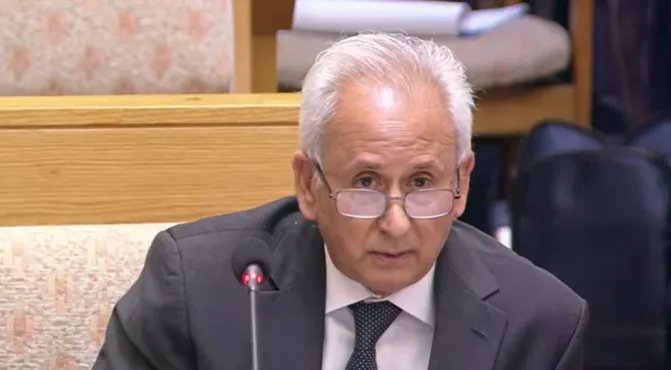
Leadership Shake-Up: How Acting Police Minister Firoz Cachalia's Management Style Differs from Suspended Minister Mchunu
Image: X
Acting Police Minister Firoz Cachalia has taken a distinctly different approach to leadership within the police ministry, swiftly assigning clear roles to his deputy ministers - an approach that contrasts sharply with his predecessor, suspended Minister Senzo Mchunu, who reportedly did not delegate tasks to his deputies during his tenure.
Cachalia outlined his management style during testimony before the parliamentary Ad Hoc Committee investigating police corruption and the controversial disbandment of the Political Killings Task Team (PKTT).
The committee was established after KwaZulu-Natal Police Commissioner Lieutenant General Mkhwanazi raised serious concerns about a crime syndicate known as the “Big Five” allegedly infiltrating law enforcement and intelligence agencies.
Mkhwanazi further alleged that Mchunu disbanded the PKTT on December 31, 2024, to protect the syndicate linked to the murder suspect and controversial businessman Vusimuzi “Cat” Matlala.
Addressing the committee, Cachalia acknowledged that while executive authority rests solely with the minister, the roles of deputy ministers are crucial given the scope and complexity of the South African Police Service (SAPS).
“As I see it, it’s the minister who exercises executive authority, not the deputy ministers. But they have important roles, especially given the breadth and complexity of the department,” Cachalia said.
Last week and again during the hearing, Deputy Ministers Cassel Mathale and Dr Paulina Boshielo testified that Mchunu had never delegated any duties to them since taking office a year ago.
In contrast, Cachalia said he has been “swamped” since his appointment and “would be unable to manage my full workload without delegating responsibilities.”
He praised the support he has received from his deputies. Mathale, a seasoned political figure and former premier with seven years of experience in the police ministry, has been a “tremendous source of insight and wisdom,” Cachalia said, adding that Mathale helped him acclimatise to the ministry after he deliberately chose not to engage with his predecessor.
Dr Boshielo, a veteran ANC National Executive Committee member, has been tasked with spearheading a critical national project to strengthen the police response to gender-based violence (GBV), a priority issue for Cachalia.
“Gender-based violence remains persistently high despite policy advances. Many police stations have victim support units, but some do not,” Cachalia told the committee.
“I’ve asked Deputy Boshielo to assemble a team of experts to conduct a thorough review of GBV support services nationwide and report back with recommendations.”
Cachalia also assigned Crime Intelligence oversight to Deputy Minister Mathale, acknowledging the persistent challenge of balancing secrecy with accountability within the secret fund and procurement processes.
“We face a complex issue with the secret fund and procurement processes in crime intelligence,” Cachalia said.
“The constitution demands transparency, but some rules are difficult to apply given the confidentiality needed. This gap has persisted for decades and may require legislative reform, which Deputy Minister Mathale will handle.”
He described his deputies as dependable partners whose political experience and dedication have helped manage the ministry’s pressing duties, citing Mathale’s representation of the department at international forums as an example.
However, Cachalia stressed that ultimate responsibility remains his.
“It is only the minister who ultimately carries the responsibility, which can create complexities, but so far we work very well together. I am committed to that collaboration.”
His testimony comes amid efforts to stabilise SAPS leadership following serious allegations of police corruption and collusion with criminal syndicates allegedly controlling police operations.
The Ad Hoc Committee’s investigation continues, with upcoming testimony from Advocate Andrea Johnson of the Investigating Directorate Against Corruption.
Parliament remains under pressure to hold police accountable amid escalating public concern over corruption and politically motivated killings.
thabo.makwakwa@inl.co.za
IOL Politics
Related Topics: